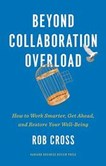- Behaviour
Avoiding Collaboration Overload
A perceptive guide to working smarter and staying on top in our ‘always-on’, highly-collaborative world
‘Tempus breve est, Ora et labor.’ Leaving aside ora (prayer), the old maxim highlights the relationship between work and time—a relationship that is under strain in today’s ‘always on’ workplace. We may love our work but when our time is overstretched, inhibiting our performance and fulfillment, it can lead to stress and disengagement.

In his new book, Beyond Collaboration Overload, Rob Cross, Professor of Global Leadership at Babson College, pinpoints ‘collaboration’ as a habitual thief of people’s time at work—stealing energy, commitment, personal relationship and even our health. This phenomenon has arisen in recent years as communication has been transformed by digital technologies, and particularly in the workplace as organizations have flattened their management structures, transparency and inclusiveness have rightly been championed, and more and faster collaboration has been roundly encouraged as being altogether positive.
In principle, collaboration between employees within organizations, as well as with external stakeholders, is positive. It is an essential driver of business performance and innovation. It is key to maintaining good communication from the top to the frontline and fostering open harmonious organizational cultures. The argument that Cross presents, based on research drawing on data from over 300 organizations over 2 decades, is that to fully realize the positive benefits and avoid the negative side of collaboration—the stress inducing overload that too many suffer from—people need to collaborate in a smarter and more purposeful way and organizations need to support this.
The increasing inter-connectedness and globalization of business, and the democratization of decision making in organizations, combined with the ease of collaboration provided by emails, texts, video platforms and social media, have spawned an ‘always on’ working culture where we are regularly drawn into, or draw others into, meetings, conversations and collaborations that are too often irrelevant for us or them and frankly a frustrating waste of our/their precious time. For leaders the problem is often exacerbated by a desire, following latest management thinking, to have an open-door policy for employees to bring their ideas and problems.
Cross uses a range to individual stories to illustrate both the damaging results of overload and some of the ‘best practices’ in smart collaboration he has observed. He then proposes a clear strategic path readers can take to conquer collaboration overload—their own and/or that of their team or organization more widely. The first step is to identify those ingrained beliefs (e.g. over-emphasis on an open-door policy) that can cause you to collaborate too easily, and then to structure your work to avoid unnecessary collaboration and focus on essential, efficient and time-conscious collaboration.
Following detailed advice on how to clear the way, Cross then shows how the time recovered can be used to collaborate more fruitfully while steering away from overload. Here, for example, he explains the importance of using personal connections to form a diverse, non-insular, and not large network of valued potential collaborators. He shows how to bring others into the network, how to mobilize the network for both short and long-term aims and how to be an energizer that gets the best out of all collaborative interactions.
For some this will pose a conundrum: they’ll just be far too busy to cultivate a network or to focus on taking any of Cross’ advice—too busy due to collaboration overload! For the sake of their personal relationships, well-being, and health this is a conundrum they should aim to resolve.
ARTICLES YOU MIGHT LIKE
RESEARCH
LBS and ESMT study identifies the danger of citing information based on the ‘gist’ of the truth rather than the ‘literal’ truth
DEVELOPING LEADERS QUARTERLY MAGAZINE AND WEEKLY BRIEFING EMAILS

































